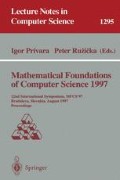Abstract
We study a logic of knowledge and time which is not only a (standard) combination of respective systems, but prescribes the interaction between the time operators and the knowledge operator in a way such that topological concepts appear. The underlying logical language could be suitable for the specification of linear time properties of programs involving knowledge. We present an axiomatization of the validities and prove its semantical completeness. Moreover, we show decidability of the logic and give a lower complexity bound for its satisfiability problem.
Preview
Unable to display preview. Download preview PDF.
References
Chellas, B. F. 1980. Modal Logic: An Introduction. Cambridge: Cambridge University Press.
Clarke, E. M., and A. P. Sistla. 1985. The Complexity of Propositional Linear Temporal Logics. Journal of the ACM 32:733–749.
Dabrowski, A., L. S. Moss, and R. Parikh. 1996. Topological Reasoning and The Logic of Knowledge. Ann. Pure Appl. Logic 78:73–110.
Fagin, R., J. Y. Halpern, Y. Moses, and M. Y. Vardi. 1995. Reasoning about Knowledge. Cambridge(Mass.): MIT Press.
Gabbay, D. M., I. Hodkinson, and M. Reynolds. 1994. Temporal Logic-Mathematical Foundations and Computational Aspects. Oxford: Clarendon Press.
Georgatos, K. 1994. Knowledge Theoretic Properties of Topological Spaces. In Knowledge Representation and Uncertainty, ed. M. Masuch and L. Polos, 147–159. Springer. LNCS 808.
Georgatos, K. 1994. Reasoning about Knowledge on Computation Trees. In Proc. Logics in Artificial Intelligence (JELIA'94), ed. C. MacNish, D. Pearce, and L. M. Pereira, 300–315. Springer. LNCS 838.
Goldblatt, R. 1987. Logics of Time and Computation. CSLI Lecture Notes Number 7. Stanford: Center for the Study of Language and Information.
Heinemann, B. 1996. ‘Topological’ Modal Logic of Subset Frames with Finite Descent. In Proc. 4th Intern. Symp. on Artificial and Mathematics, AI/MATH-96, 83–86. Fort Lauderdale.
Heinemann, B. 1997. Topological Nexttime Logic. In Proc. Advances in Modal Logic, AiML 96. Kluwer series. to appear 1997.
Manna, Z., and A. Pnueli. 1992. The Temporal Logic of Reactive and Concurrent Systems. New York: Springer.
Moss, L. S., and R. Parikh. 1992. Topological Reasoning and The Logic of Knowledge. In Proc. lath Conf. on Theoretical Aspects of Reasoning about Knowledge (TARK 1992), ed. Y. Moses, 95–105. Morgan Kaufmann.
Author information
Authors and Affiliations
Editor information
Rights and permissions
Copyright information
© 1997 Springer-Verlag Berlin Heidelberg
About this paper
Cite this paper
Heinemann, B. (1997). A topological generalization of propositional linear time temporal logic. In: Prívara, I., Ružička, P. (eds) Mathematical Foundations of Computer Science 1997. MFCS 1997. Lecture Notes in Computer Science, vol 1295. Springer, Berlin, Heidelberg. https://doi.org/10.1007/BFb0029972
Download citation
DOI: https://doi.org/10.1007/BFb0029972
Published:
Publisher Name: Springer, Berlin, Heidelberg
Print ISBN: 978-3-540-63437-9
Online ISBN: 978-3-540-69547-9
eBook Packages: Springer Book Archive

